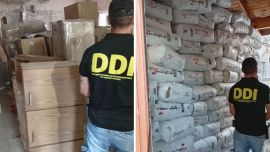A public spending boom and generous tax cuts carried out by Argentina’s Economy Minister Sergio Massa, who’s also running for president in the October election, pose new setbacks to the country’s US$44-billion program with the International Monetary Fund, according to the Washington-based lender.
“The recently adopted policy measures and announcements add to Argentina’s challenges,” IMF chief spokesperson Julie Kozack said at a press conference in Washington Thursday. “The economic situation remains very challenging and complex.”
The IMF’s rare public criticism of Argentina underscores growing concerns about the future of the financial assistance programme received by the South American nation, the largest ever granted by the Fund. Under Massa’s watch, Argentina missed all of the targets agreed with the IMF through the end of June and looks poised to miss them all again in September.
After receiving US$7.5 billion from the IMF in August, Massa turned his back on austerity commitments he had made in exchange for the money and increased social welfare payments, public-sector salaries while cutting income taxes for almost all Argentines. The spending spree is part a strategy to try to overcome the ruling coalition’s defeat in the primary election.
Yet the additional spending, largely financed by the Central Bank’s money-printing machines, risks further stoking inflation that’s already running at 124 percent a year.
Massa’s rhetoric as a candidate poses additional challenges to the relationship with the IMF. In public speeches, he routinely accuses the lender of having forced the government to devalue its official exchange rate by 18 percent as a condition for the disbursement of the funds, even though he had agreed with the terms of the deal. The one-time devaluation, announced the day after the August 13 primary election, caused prices to skyrocket overnight, accelerating inflation to its fastest pace in three decades.
Asked about a proposal to adopt the dollar as Argentina’s official currency, an idea defended by presidential frontrunner Javier Milei to end inflation, Kozack said such a move alone won’t fix Argentina’s problems.
“Dollarisation requires important preparatory steps, and it is not a substitute for sound macroeconomic policies,” she said, without detailing what steps the IMF would like to see.
by Patrick Gillespie, Eric Martin & Manuela Tobias, Bloomberg



















Comments